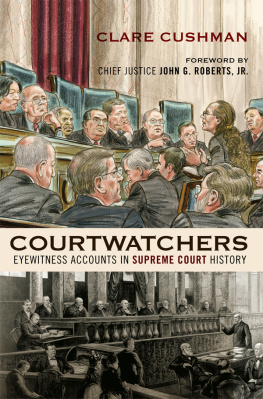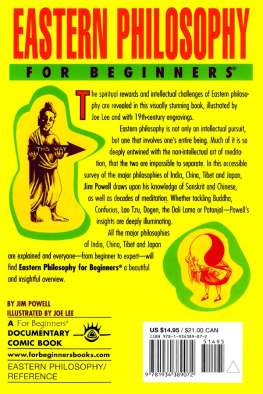Cushman - A beginners history of philosophy, Vol. 1
Here you can read online Cushman - A beginners history of philosophy, Vol. 1 full text of the book (entire story) in english for free. Download pdf and epub, get meaning, cover and reviews about this ebook. City: Boston, year: 1970, publisher: H. Mifflin, genre: Religion. Description of the work, (preface) as well as reviews are available. Best literature library LitArk.com created for fans of good reading and offers a wide selection of genres:
Romance novel
Science fiction
Adventure
Detective
Science
History
Home and family
Prose
Art
Politics
Computer
Non-fiction
Religion
Business
Children
Humor
Choose a favorite category and find really read worthwhile books. Enjoy immersion in the world of imagination, feel the emotions of the characters or learn something new for yourself, make an fascinating discovery.
- Book:A beginners history of philosophy, Vol. 1
- Author:
- Publisher:H. Mifflin
- Genre:
- Year:1970
- City:Boston
- Rating:4 / 5
- Favourites:Add to favourites
- Your mark:
- 80
- 1
- 2
- 3
- 4
- 5
A beginners history of philosophy, Vol. 1: summary, description and annotation
We offer to read an annotation, description, summary or preface (depends on what the author of the book "A beginners history of philosophy, Vol. 1" wrote himself). If you haven't found the necessary information about the book — write in the comments, we will try to find it.
A beginners history of philosophy, Vol. 1 — read online for free the complete book (whole text) full work
Below is the text of the book, divided by pages. System saving the place of the last page read, allows you to conveniently read the book "A beginners history of philosophy, Vol. 1" online for free, without having to search again every time where you left off. Put a bookmark, and you can go to the page where you finished reading at any time.
Font size:
Interval:
Bookmark:



TO
GEORGE HERBERT PALMER, Lrrr.D., LL.D< ALFORD PROFESSOR OF PHILOSOPHY
IN HARVARD UNIVERSITY WHO HAS INTERPRETED LIFE TO
MANY YOUNG MEN BY MAKING I
PHILOSOPHY A LIVING
SUBJECT TO THEM
PREFACE
THIS book is intended as a text-book for sketch-courses in the history of philosophy. It is written for the student rather than for the teacher. It is a history of philosophy upon the background of geography and of literary and political history.
As a text-book for sketch-courses it employs sum maries, tables, and other generalizations as helps to the memory. The philosophical teaching is presented as simply as possible, so as to bring into prominence only the leading doctrines. My own personal criticism and interpretation on the one hand, and explanations in technical language on the other, have been avoided as far as possible. Sometimes I have had to choose between interpretation and technicality, in which case the limita tions of space have determined my choice. Since the book is intended for the student rather than for the teacher, it makes the teacher all the more necessary; for it puts into the hands of the student an outline and into the hands of the teacher the class-room time for inspiring the student with his own interpretations. In making use of geographical maps, contemporary litera ture, and political history, this book is merely utilizing for pedagogical reasons the stock of information with which the college student is furnished when he begins the history of philosophy.
A good many years of experience in teaching the history of philosophy to beginners have convinced me that students come to the subject with four classes of
ideas, with which they can correlate philosophic doc trines: good geographical knowledge, some historical and some literary knowledge, and many undefined per sonal philosophical opinions. Of course, their personal philosophical opinions form the most important group, but more as something to be clarified by the civilizing influence of the subject than as an approach to the sub ject itself. The only "memory-hooks" upon which the teacher may expect to hang philosophic doctrines are the student's ideas of history, literature, and geography. If the history of philosophy is treated only as a series of doctrines, the student beginning the subject feels not only that the land is strange, but that he is a stranger in it. Besides, to isolate the historical philosophical doc trines is to give the student a wrong historical perspec tive, since philosophic thought and contemporary events are two inseparable aspects of history. Each interprets the other, and neither can be correctly understood with out the other. If the history of philosophy is to have any significance for the beginner, it must be shown to give a meaning to history.
So far as the materials that form any history of phi losophy are concerned, I have merely tried to arrange and organize them with reference to the student and with reference to the history of which they form an in tegral part. I am therefore overwhelmingly indebted to every good authority to whom I have had access, but in the main I have followed the inspiring direction of the great Windelband. Many willing friends have read parts of the manuscript and offered suggestions and criticisms. I am particularly indebted to Professors C. P. Parker, Ephraim Emerton, A. O. Norton, and J. H. Ropes, and Dr. B. A. G. Fuller of Harvard University;
to Professor Mary W. Calkins of Wellesley College ; to Professors C. S. Wade and D. L. Maulsby of Tufts Col lege ; and to my wife, Abby B. Cushman. However, for all the faults of the book, which has been many years in preparation, I am alone responsible.
Instead of lists of books for collateral reading, placed at the end of chapters or of the book, the student will find references in the footnotes to the exact pages of many helpful books. I should like to call the student's attention to an appendix to the discussion of Plato. This is a complete selection of passages from Plato made by the late Professor Jowett for English readers. This selection Professor Jowett was accustomed to dis tribute to his Oxford class, of which I was once fortu nate to be a member.
Philosophical terms have been defined either in the text or in the footnotes. Such definitions must neces sarily have as their aim their usefulness to the student, rather than their completeness.
TUFTS COLLEGE, June, 1910.
PREFACE TO THE REVISED EDITION
THE only change which the reader will find in the revision of this volume is in the form of presentation of the philosophies of the earlier cosmologists (Chap-ter II).
HERBERT E. CUSHMAN.
WEST NEWTON, February, 1918.

CONTENTS
CHARACTERISTICS OF THE COSMOLOGISTS 18
TABLE OF COSMOLOGISTS .. 20
How THE PHILOSOPHICAL QUESTION AROSE .... 20
MAP SHOWING THE ClTIES WHERE THE COSMOLOGISTS
91 LIVED
SUMMARY COMPARISON OF THE MONISTIC PHILOSOPHIES 22
1. THE MILESIAN SCHOOL 24
THE MILESIAN PHILOSOPHY 25
2. XENOPHANES, THE RELIGIOUS PHILOSOPHER ... 26 THE PHILOSOPHY OF XENOPHANES 27
3. HERACLEITUS, "THE MISANTHROPIST" AND "THE
OBSCURE " 28
a. Heracleitus' Doctrine of Absolute and Universal
Change 28
b. Fire is the Cosmic Substance 29
c. The Definite Changes of Fire 30
d. The Practical Philosophy of Heracleitus .... 31
4. THE ELEATIC SCHOOL 32
a. PARMENIDES 32
(1) The Cosmic Substance is Being 33
(2) Other Tbiugs than the Cosmic Substance (Being)
have no Real Existence 34
b. ZENO 35
THE PHILOSOPHY OF ZENO 36
THE RESULTS OF THE CONFLICT BETWEEN HERACLEITUS AND PARMENIDES 37
CHAPTER III. PLURALISM 39
EFFORTS TOWARD RECONCILIATION 39
THE NEW CONCEPTION OF CHANGE OF THE PLURALISTS 40 THE NEW CONCEPTION OF THE UNCHANGING OF THE
PLURALISTS THE ELEMENT 40
THE INTRODUCTION OF THE CONCEPTION OF THE EFFI CIENT CAUSE 41
SUMMARY OF SIMILARITIES AND DIFFERENCES IN THE
THE PLURALISTIC PHILOSOPHERS : EMPEDOCLES, ANAXA-
GORAS, LEUCIPPUS, AND THE LATER PYTHAGOREANS . 42
THE PHILOSOPHY OF EMPEDOCLES 44
THE PHILOSOPHY OF ANAXAGORAS 45
THE PHILOSOPHY OF THE ATOMISTS LEUCIPPUS AND
THE SCHOOL AT ABDERA 47
THE LATER PYTHAGOREANS 48
1. The Pythagorean Conception of Being .... 49
2. The Pythagorean Dualistic World 51
3. Pythagorean Astronomy 52
HISTORICAL RETROSPECT 53
CHAPTER IV. THE ANTHROPOLOGICAL PERIOD: THE
PHILOSOPHY OP MAN 55
AN HISTORICAL SUMMARY OF THE ANTHROPOLOGICAL
PERIOD 55
THE PERSIAN WARS AND THE RISE OF ATHENS ... 56
THE GREEK ENLIGHTENMENT 58
1. The Impulse for Learning 58
2. The Practical Need of Knowledge 59
3. The Critical Attitude of Mind 61
THE SIGNIFICANCE OF THE SOPHISTS 64
THE PROMINENT SOPHISTS 67
THE PHILOSOPHY OF THE SOPHISTS 68
1. The Relativism of Protagoras 69
2. The Nihilism of Gorgias 70
THE ETHICS OF THE SOPHISTS. THE APPLICATION OF
THEIR CRITICAL THEORY TO POLITICAL LIFE ... 71
SUMMARY 73
CHAPTER V. SOCRATES 74
SOCRATES AND ARISTOPHANES 74
THE PERSONALITY AND LIFE OF SOCRATES 75
Font size:
Interval:
Bookmark:
Similar books «A beginners history of philosophy, Vol. 1»
Look at similar books to A beginners history of philosophy, Vol. 1. We have selected literature similar in name and meaning in the hope of providing readers with more options to find new, interesting, not yet read works.
Discussion, reviews of the book A beginners history of philosophy, Vol. 1 and just readers' own opinions. Leave your comments, write what you think about the work, its meaning or the main characters. Specify what exactly you liked and what you didn't like, and why you think so.













